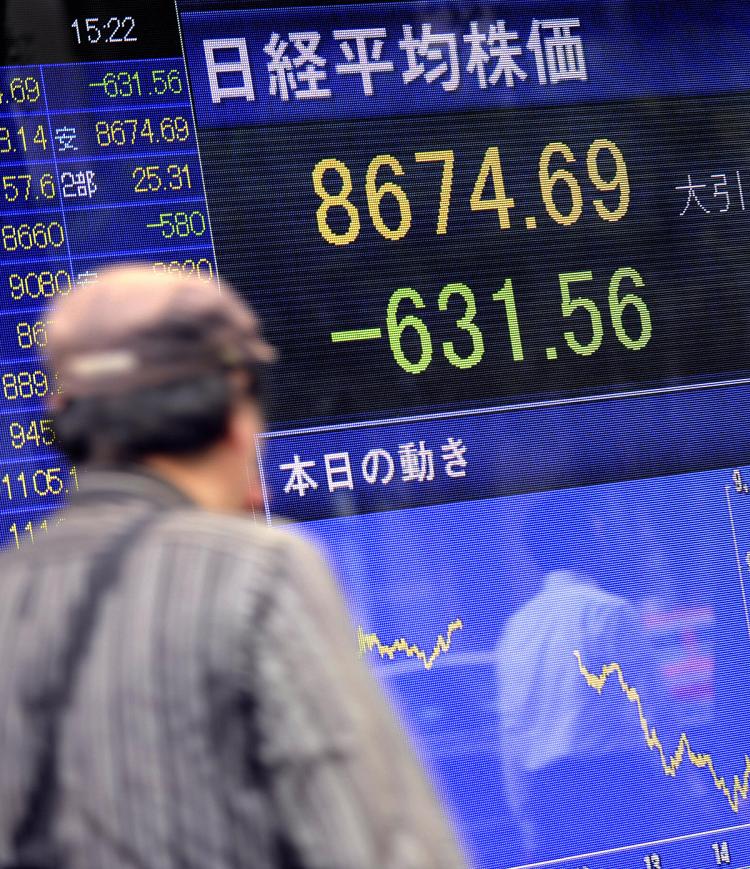This week’s data showed that Japanese exports tumbled a record 47 percent in January, eclipsing a then-record 35 percent drop in December 2008. The drop in exports caused a record 953 billion yen ($9.9 billion) trade deficit, the highest since recordkeeping began.
The reason? Depressed consumer spending in the United States and Europe has dragged down the fortunes of the Japanese economy, which is heavily dependent upon exports of electronics, automobiles, and other high-tech products.
“The drop in exports is unbelievably bad,” Yasuhide Yajima, a senior economist at NLI Research Institute in Tokyo, said in an interview with Bloomberg. “The pressure on companies to cut jobs and investment is rising and that will make the recession deep and protracted.”
Japanese Finance Minister told reporters on Tuesday that exports to the United States declined 53 percent from the prior year, and exports to Europe fell 47 percent as millions of consumers in western countries face layoffs and foreclosures in the worst economic recession since the Great Depression.
Declining foreign demand has hurt many of Japan’s largest companies, many of which rely on exports to account for more than half of their annual revenues.
According to Nikkei, Toyota Motor Corp. announced this week that it would cut 2009 production by 20 percent to 6.5 million vehicles worldwide. Toyota already said earlier this month that it would slash production in North America.
Last month, electronics giant Sony Corp. said its net profit plunged 95 percent last quarter as sales of televisions, digital cameras, and consumer electronics tumbled. The company also announced 8,000 job cuts and decreased its outlook for fiscal year 2009.
Fellow electronics maker Panasonic Corp. is also making deep cuts in preparation for a prolonged global recession. The Osaka-based manufacturer said it would eliminate 15,000 jobs and shutter 27 assembly plants worldwide. Panasonic reported a 63.1 billion ($709 million) quarterly loss.
On Monday, Nomura Holdings, Japan’s largest brokerage and investment bank, sold 291.2 billion ($3.1 billion) worth of shares at a 12 percent discount to raise additional capital. The bank has been hurt by deteriorating credit conditions and its recent purchase of Lehman Brothers’ Asian business.
Adding insult to injury, economists predict that Japan’s economy may shrink at a much higher pace this year than previously anticipated.
Record Low Consumer Confidence
Japan’s economic situation may not see a quick turnaround as this week’s report by the Conference Board Survey showed that U.S. consumer confidence reached record lows this month. The Board is a unit of British ad agency WPP Group Plc.
The Board’s report showed consumer confidence dipped to 25.0, a drop of 12.4 points from the previous month, as consumers digested an increasingly dire view of the U.S. economy despite repeated reassurances from the Obama administration.
Confidence may continue to sag as home prices continue to drop and Federal Reserve Board Chairman Ben Bernanke’s assertion on Tuesday that the U.S. economy may not recover until 2010 don’t paint a rosy picture.
“Looking ahead, increasing concerns about business conditions, employment and earnings have further sapped confidence and driven expectations to their lowest level ever,” Director of The Conference Board Consumer Research Center Lynn Franco said in a statement. “All in all, not only do consumers feel overall economic conditions have grown more dire, but just as disconcerting, they anticipate no improvement in conditions over the next six months.”
But Japanese firms are already counting on continued U.S. spending weakness, but the recent strength of the Japanese yen introduces a new layer of complexity.
In 2008, the yen gained 23 percent on the U.S. dollar—hurting Japanese companies that make most of their money overseas. Companies must convert foreign sales back to the yen, which depresses earnings if the yen is particularly strong.
“If the yen stays at this strong level, it’s likely the economic recession” will continue, Honda Motor Co. president Takeo Fukui told Bloomberg.
“A rate stronger than 100 [yen to one U.S. dollar] makes things difficult,” he said.






Friends Read Free